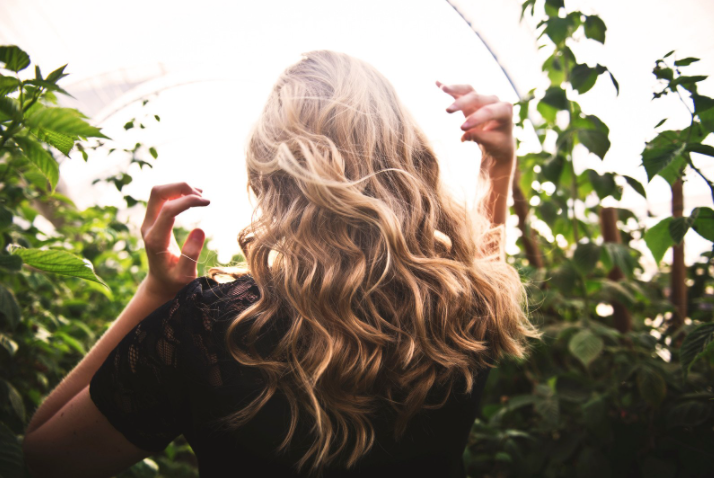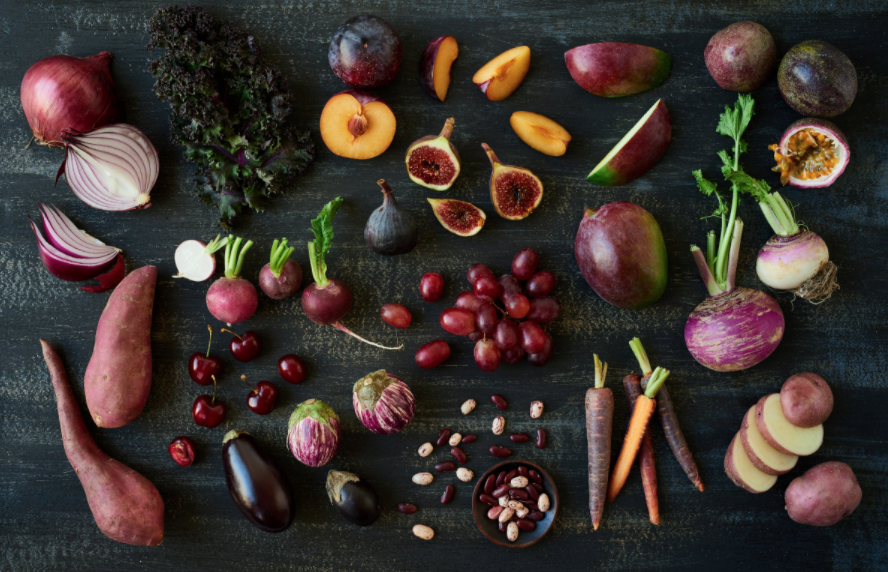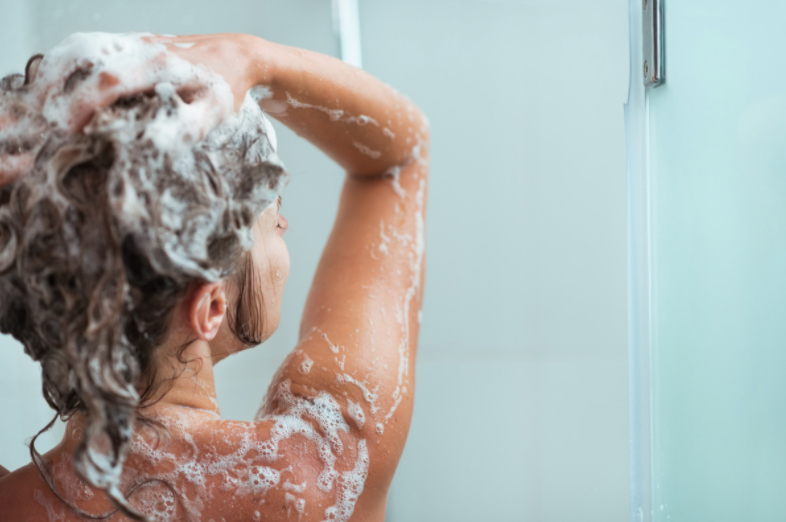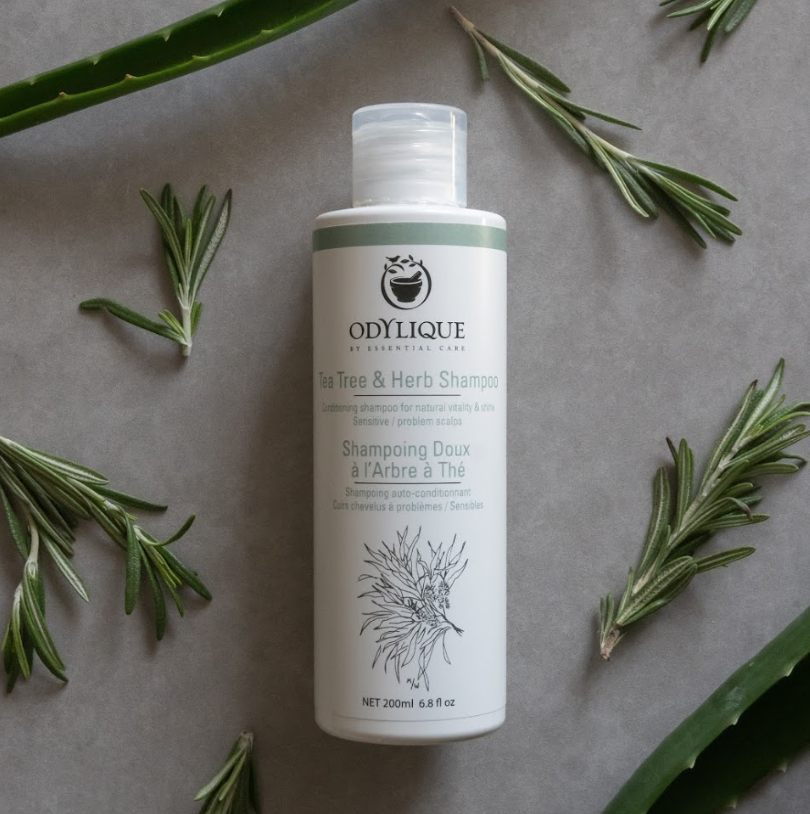7 Simple Ways To Treat A Flaky Scalp 100% Naturally!
A flaky scalp can be unsightly, frustrating and hard to disguise - the only real solution is to find the source and banish the flakes at the root!
Our 7 simple steps reveal a natural and holistic approach to soft, flake-free hair you can be proud of.

1. Choose organic hair care.
In many cases, the problem is simply irritation from hair care ingredients.
Synthetic hair products tend to contain largely unregulated, irritating preservatives and detergents known to have a strong oil-stripping effect. This can break down the skin’s natural protective barrier, causing a dry, irritated and flaky scalp. This also allows the entry of microbes, which can potentially exacerbate the problem.
Sodium laurel sulfate, for example, is a known skin irritant and is used in hundreds of conventional shampoos (which is why it’s important to read the label)!
Switch from synthetic to organic products to help calm irritation, balance scalp flora and avoid unnecessary synthetic ingredients.
Genuine organic shampoos are based on gentle, sulfate free cleansing agents and are free from synthetic irritants.
Odylique shampoos are based on a high concentration of repairing and soothing organic aloe vera juice, which is rich in minerals and amino acids. Additional nutrients from coconut, chamomile, horsetail, nettle and rosemary also support a healthy scalp and strong hair growth.
Allow at least a few weeks for your scalp to calm and adjust to your new shampoo and (hopefully!) watch flakiness subside.
2. Clarifying Shampoo
Another effect synthetic hair products (like hairspray and shampoo) have is product build up.
‘Build-up’ is residue from products coating the hair and clogging the scalp, which can give the appearance of soft, white flakes.
To get rid of product build-up, our shampoos also act as clarifying shampoos, meaning they deeply cleanse away residual product. The cleansing aloe vera juice and essential oils help to oxygenate the scalp and hair and rid it of any residue, which in turn, will eliminate these types of flakes.
If you’ve always used synthetic shampoos, the likelihood is, is that they’ve disguised underlying damage, so cleansing your hair from them will likely reveal the true appearance of you hair. This could mean it looks a little less shiny and manageable than usual because it no longer has the plastic-like coating. This transition can be smoothed (literally) with natural botanicals, which can penetrate into the hair shaft to improve condition and resilience against further damage.
Persevere for at least a couple of weeks – this will give your hair time to adjust and benefit from the natural ingredients and once again be shiny and soft – naturally!
3. Nourish your dry scalp
A dry scalp can mean a flaky scalp. A number of environmental factors can contribute to a dry scalp, including diet, cosmetic use and stress.
A dry scalp can also be a natural outcome from chilly temperatures outside! Dry skin is more prevalent in the winter due to atmospheric changes withdrawing moisture from your skin.
To replenish moisture levels in the scalp, consider an overnight scalp treatment. We recommend our ultra-moisturizing Ultra Rich Balm, which is an organic concentrate of coconut and shea butters, olive and sea buckthorn fruit.
This can be massaged onto your scalp in the evening, to be left on overnight. Our Ultra Rich Balm can also be run through the ends of your hair, which can be prone to breaking - to protect and nourish throughout the day.
Be sure to wash it out in the morning with a natural shampoo, though! Repeat the process as often as you like – ideally about once per week.
4. Antifungal shampoo
Perhaps one of the most misunderstood causes of a flaky scalp is dandruff. Many presume that any flake is classed as dandruff, but that’s not the case.
Dandruff is thought to be caused by an overgrowth of yeast called Malassezia which feeds on the oils in produced by your scalp.
More recently, however, a study has shown that dandruff may not be due to the not yeasts, but an overgrowth of certain bacteria, which creates an imbalance in the natural scalp microflora. This is regardless of whether the scalp and hair are oily or dry. This may explain why conventional and often potent, antifungal treatments and shampoos don’t always solve the problem and may even upset the balance further.
Tea tree essential oil on the other hand, is skin-kind yet effective against both yeasts and bacteria, helping to reduce the overall microbial population. So if you suspect a microbial imbalance, our Tea Tree Shampoo could tick all the boxes with regular use.
5. Rule out eczema (and other skin conditions)!
A common characteristic of skin conditions like eczema is flaky skin and unfortunately, it can appear on your scalp. Of course, this doesn’t mean every flaky scalp is a result of eczema, but to rule it out completely, we recommend getting a diagnosis by a healthcare professional if you are concerned.
If you do have eczema, don’t panic – all of the advice outlined here can be used on eczema prone skin. In fact, we urge those with a skin condition to be open to try a natural approach and see the results for themselves!
If you have eczema of the scalp, itching, redness and scaly skin will most likely accompany it.
How can we help? Our Repair Lotion can be used as an overnight scalp treatment and has some fantastic customer reviews:
“This lotion is the only one that has cleared up my facial eczema”
“This cream is absolutely the best one I have used for dermatitis and eczema in nearly 35 years.”
“I come back to this cream again and again when my eczema flares up, it just works brilliantly. Thank you!”
To try it for yourself, it can also be applied as an overnight treatment. Rather than putting it through your hair like a hair mask, massage it close to the roots on the scalp only and wash it out in the morning. Do this 2-3 times per week for 2 weeks and assess your scalp from there!
6. Diet
Diet has a big impact on your health, including the health of your scalp and hair! Diet can contribute to many of the issues already outlined – dry skin, fungal infections and eczema.
Of course eating lots of fruits and veggies is a good place to start, but depending on the diagnosis, different foods can help supplement something you might be lacking in. For example, antifungal foods like coconut oil or garlic would be a great addition if you have a fungal infection. Or, if inflammation is causing an issue, a Mediterranean diet has shown beneficial effects.
We do recommend consulting a professional in this area, such as a nutritionist to get the best, personalized advice to target the cause of your scalp issue. Issues like candida overgrowth (which can contribute to a flaky scalp, as well as other symptoms) can involve a dietary overhaul that you might prefer some guidance with!
Online research can also reveal the benefits of specific foods also research online which foods are going to tackle specific issues – we have to say, eating your way to health is one of the more enticing ways to achieve results!
7. Probiotics
Taking probiotics is a great way to balance the bacteria in the gut, which can easily get out of sync. Diet, medication and stress are all factors that can interrupt gut health, but aren’t always factors we can control.
But what has gut health got to do with your flaky scalp?
A study revealed that the supplementation of Lactobacillus paracasei (a strain of bacteria that can be taken as a probiotic) significantly reduced the symptoms of dandruff after 56 days. Although the study had a positive outcome, the reason isn’t fully understood, but thought to be to do with having an impact on the skin barrier and skin immune system.
If you’re interested in trying the probiotic out for yourself, you can buy it
If you'd like any more advice, please do email us – info@odylique.com, add your question as a comment below - we're here to help!



